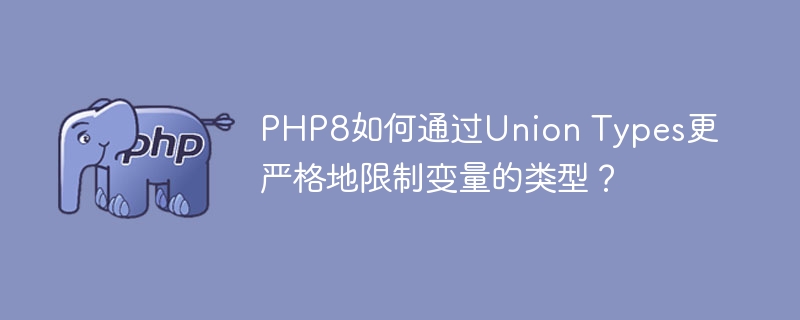

How does PHP8 restrict the type of variables more strictly through Union Types?
In past PHP versions, the types of variables were relatively free. We could assign different type values to a variable, which may lead to type inconsistencies in the program. Fortunately, PHP8 introduces Union Types, which can more strictly limit the types of variables and improve the robustness of the code.
What are Union Types? Union Types means that a variable can accept multiple different types, that is, the type of the variable is the union of these types. Using Union Types in function parameters, function return values, and property declarations can ensure that the values passed in or returned are what we expect.
The following is a specific code example to demonstrate how to use Union Types:
// 函数接收两个整型参数,并返回它们的和
function sum(int|float $num1, int|float $num2): int|float {
return $num1 + $num2;
}
// 调用sum函数
$result1 = sum(5, 3); // 返回整型7
$result2 = sum(2.5, 4.5); // 返回浮点型7.0
$result3 = sum("10", 5); // 会产生类型错误,因为字符串类型不在Union Types定义的范围内In the above example, the sum function receives two parameters. The types of these two parameters can be integers or Floating point type. The return value of a function can also be an integer or floating point type. When we pass in an integer parameter, the function will return an integer result; when we pass in a floating point parameter, the function will return a floating point result.
In addition, if we pass in a type that is not defined in Union Types, such as a string type, PHP8 will throw a type error at runtime. This strict type checking can help us find potential type errors earlier in the development process, reducing debugging time and code maintenance costs.
In addition to function parameters and return values, we can also use Union Types in attribute declarations, for example:
class User {
private int|string $id;
public function setId(int|string $id): void {
$this->id = $id;
}
public function getId(): int|string {
return $this->id;
}
}
// 创建一个User对象
$user = new User();
$user->setId(100);
echo $user->getId(); // 输出整型100
$user->setId("admin");
echo $user->getId(); // 输出字符串"admin"In the above example, the id attribute of the User class can be an integer or a string type. By using Union Types, we can better describe the data type of a property, thus preventing type errors when using it.
In summary, PHP8 can more strictly limit the types of variables and improve the robustness and stability of the program by introducing Union Types. We can use Union Types to define multiple types in function parameters, return values, and property declarations to ensure that the values passed in and returned are what we expect. This strict type checking can help us find potential type errors earlier and improve the readability and maintainability of the code. It is worth noting that using Union Types requires the support of PHP8 and above.
The above is the detailed content of How does PHP8 restrict the type of variables more strictly through Union Types?. For more information, please follow other related articles on the PHP Chinese website!




